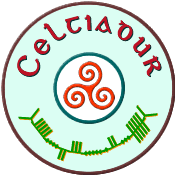
Welcome to Celtiadur, a collection of Celtic cognates, or words that are similar in some or all of the Celtic languages. It includes the modern Celtic languages (Irish, Scottish Gaelic, Manx, Welsh, Cornish and Breton), older versions of these languages, such as Middle Welsh, Old Irish, and their extinct and reconstructed relatives and ancestors, including Gaulish, Celtiberian, Proto-Brythonic and Proto-Celtic. It also includes the etymology (origins) of the words, where known, and related words and expressions.
The idea is to show the connections between the Celtic languages, and how words have changed in spelling, pronunciation and meaning over time.
The name Celtiadur is one I coined which combines the word celt and the Welsh (and Breton) suffix -adur, which appears in such words as geiriadur (dictionary), dyddiadur (diary), gwyddoniadur (encyclopedia) and ieithiadur (grammar, dictionary, vocabulary).
The logo features the word Celtiadur in the Gaelic script (Cló Gaelach) and in the Ogham alphabet, along with the triskelion symbol, which is the traditional symbol of the Isle of Man and Brittany (and of Sicily), and is considered a Celtic symbol.
You can also find Celtic cognates on Omniglot.